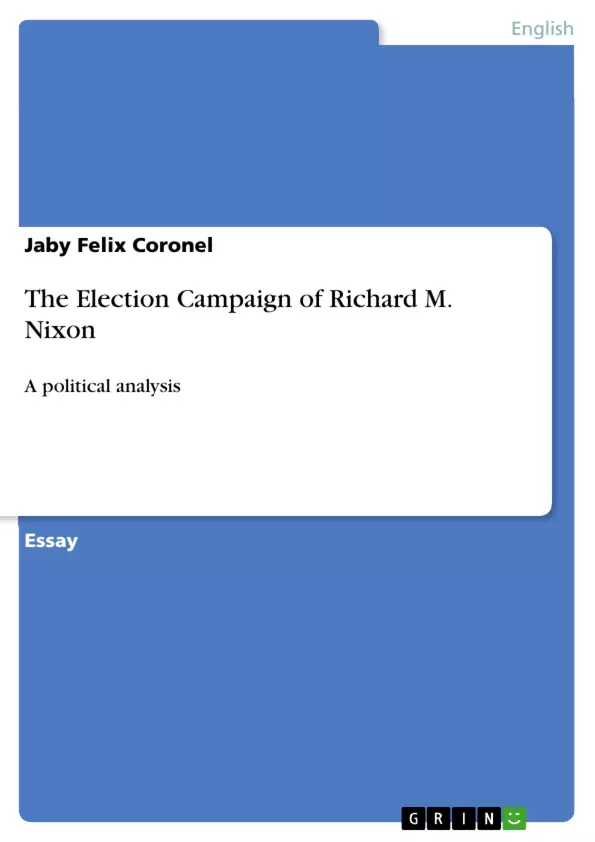In this thesis the election campaign of the 37th President of the United States Richard Milhous Nixon 1968 is examined. Nixon’s election campaign was successful and is therefore relevant to analyze.
At first, the significant background story of Nixon’s political career is presented including the main players. This is followed by the answering, why his campaign to the 37th nominee of the United States president was effective and how the marketing strategies worked efficiently. In detail, it is examined whether some parts of the campaigns were successful and which statements he held wrongly. In the final stage of this thesis, a conclusion of Nixon’s fight for the presidency is drawn.
Inhaltsverzeichnis (Table of Contents)
- Abstract
- Relevant History
- Marketing Campaign Strategies
- Foreign politics versus domestic issues
- First electoral campaign (1968)
- Success through criticism
- Catchpenny promises
- Resume
- Sources
Zielsetzung und Themenschwerpunkte (Objectives and Key Themes)
This thesis examines the 1968 election campaign of Richard Nixon, the 37th President of the United States. The analysis focuses on the effectiveness of Nixon's campaign strategies, including his marketing techniques and the political landscape of the time.
- Nixon's political background and his rise to prominence.
- The strategies employed by Nixon's campaign team to secure his nomination and victory.
- The role of foreign policy, particularly the Vietnam War, in Nixon's campaign.
- The effectiveness of Nixon's message and his ability to connect with voters.
- The challenges Nixon faced from his opponents and the political climate of the era.
Zusammenfassung der Kapitel (Chapter Summaries)
- Abstract: This section provides a brief overview of the thesis, outlining the scope of the analysis and the key findings.
- Relevant History: This chapter outlines Nixon's political career from his early days in student government to his role as Vice President under Eisenhower. The chapter also highlights key moments that shaped Nixon's political ambitions and shaped his approach to the 1968 campaign.
- Marketing Campaign Strategies: This chapter delves into the specifics of Nixon's 1968 campaign, examining the marketing strategies employed by his team. It analyzes the role of foreign policy, particularly the Vietnam War, in Nixon's campaign and explores the strategies used to position him as a strong leader capable of addressing both domestic and international issues.
- Catchpenny promises: This chapter focuses on the promises and pledges made by Nixon during his campaign. It analyzes the effectiveness of these promises and their impact on the electorate.
Schlüsselwörter (Keywords)
Key themes and concepts explored in this thesis include: Richard Nixon, 1968 election campaign, Vietnam War, foreign policy, domestic policy, political strategy, marketing, voter perception, Republican Party, Democratic Party, electoral college.
Frequently Asked Questions
What was the main focus of Richard Nixon's 1968 campaign?
The campaign focused on a mix of foreign policy (especially the Vietnam War) and domestic issues, using effective marketing to position Nixon as a strong leader.
Why was Nixon's marketing strategy considered effective?
Nixon's team used professional marketing techniques to craft his image, focusing on criticism of the current administration and making strategic promises to different voter blocks.
What role did the Vietnam War play in the election?
The war was a dominant foreign policy issue. Nixon's stance and his promises regarding the conflict were crucial for his electoral success.
What were "catchpenny promises" in Nixon's campaign?
The thesis examines specific pledges and promises made by Nixon to win over voters, analyzing whether they were realistic or primarily intended to secure votes.
What was Nixon's political background before 1968?
Nixon had a long political career, including serving as Vice President under Eisenhower, which provided him with the necessary prominence for his presidential run.
- Quote paper
- Jaby Felix Coronel (Author), 2016, The Election Campaign of Richard M. Nixon, Munich, GRIN Verlag, https://www.grin.com/document/904826



